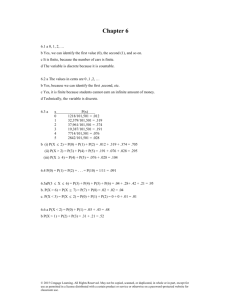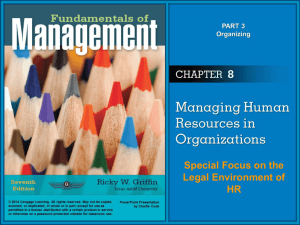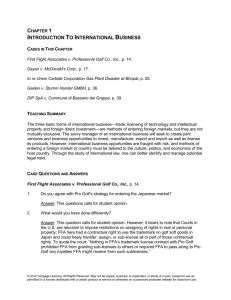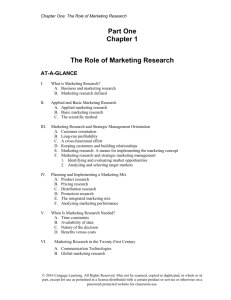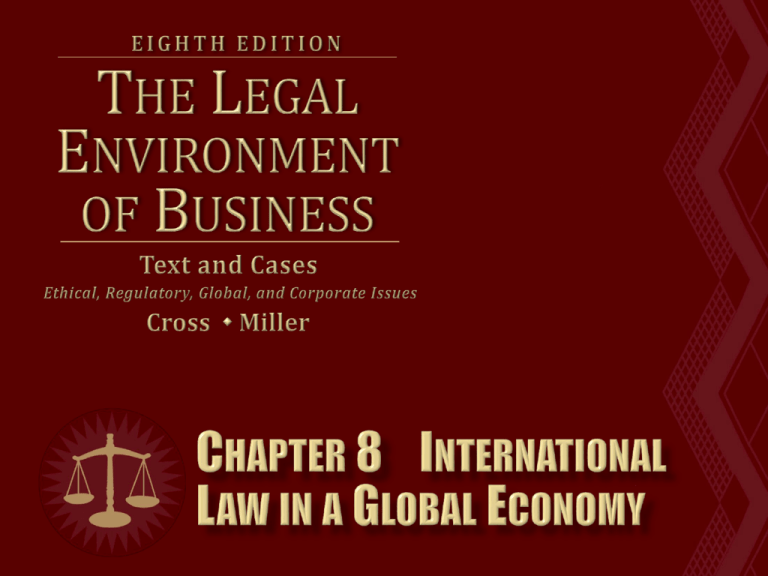
International
Law.
Body
of law - formed as a result
of international customs, treaties,
and organizations - that governs
relations among or between
nations.
National
Law
Law.
of a particular nation.
© 2012 Cengage Learning. All Rights Reserved. May not be copied, scanned, or duplicated, in whole or in part, except for use as
permitted in a license distributed with a certain product or service or otherwise on a password-protected website for classroom use.
2
International
law is the result
of attempts to reconcile the
need of each country to be
the final authority over its
own affairs and the desire to
benefit from relations with
one another.
© 2012 Cengage Learning. All Rights Reserved. May not be copied, scanned, or duplicated, in whole or in part, except for use as
permitted in a license distributed with a certain product or service or otherwise on a password-protected website for classroom use.
3
International
Customs:
evidence of a general
principle accepted as law
(Sect. 38(1) of the Statute of the
International Court of Justice)
Treaties and International
Agreements.
© 2012 Cengage Learning. All Rights Reserved. May not be copied, scanned, or duplicated, in whole or in part, except for use as
permitted in a license distributed with a certain product or service or otherwise on a password-protected website for classroom use.
4
International
Organizations:
mainly composed of
representatives from member
nations, usually established
by treaty.
© 2012 Cengage Learning. All Rights Reserved. May not be copied, scanned, or duplicated, in whole or in part, except for use as
permitted in a license distributed with a certain product or service or otherwise on a password-protected website for classroom use.
5
Companies
Doing Business in
Foreign Nations are subject to
the laws of those nations.
Common
Law Systems: courts
independently develop rules by
stare decisis for certain areas of
law, not covered by statutory law.
© 2012 Cengage Learning. All Rights Reserved. May not be copied, scanned, or duplicated, in whole or in part, except for use as
permitted in a license distributed with a certain product or service or otherwise on a password-protected website for classroom use.
6
Companies
Doing Business in
Foreign Nations (cont’d).
Civil
Law Systems: Most of
Europe, Asia, Africa, Latin
America based on Roman civil law
or “code law.”
Primary source of law is statutory
code. Courts interpret the code,
but decisions are not binding.
© 2012 Cengage Learning. All Rights Reserved. May not be copied, scanned, or duplicated, in whole or in part, except for use as
permitted in a license distributed with a certain product or service or otherwise on a password-protected website for classroom use.
7
Companies
Doing Business in
Foreign Nations (continued).
Islamic
Legal Systems: sharia
legal code is based on religious
principles that govern a Muslim’s
way of life.
© 2012 Cengage Learning. All Rights Reserved. May not be copied, scanned, or duplicated, in whole or in part, except for use as
permitted in a license distributed with a certain product or service or otherwise on a password-protected website for classroom use.
8
The
most important principles
and doctrines applied in the
interest of maintaining
harmonious relations among
nations:
Principle of Comity.
Act of State Doctrine.
Doctrine of Sovereign Immunity.
© 2012 Cengage Learning. All Rights Reserved. May not be copied, scanned, or duplicated, in whole or in part, except for use as
permitted in a license distributed with a certain product or service or otherwise on a password-protected website for classroom use.
9
One nation will defer and give
effect to the laws and judicial
decrees of another country, as
long as those laws and judicial
decrees are consistent with the
law and public policy of the
accommodating nation.
© 2012 Cengage Learning. All Rights Reserved. May not be copied, scanned, or duplicated, in whole or in part, except for use as
permitted in a license distributed with a certain product or service or otherwise on a password-protected website for classroom use.
10
Judicial
branch of one country
will not examine the validity of
public acts by foreign
government within its own
territory. Often invoked to
protect expropriation, and
confiscation.
© 2012 Cengage Learning. All Rights Reserved. May not be copied, scanned, or duplicated, in whole or in part, except for use as
permitted in a license distributed with a certain product or service or otherwise on a password-protected website for classroom use.
11
Exempts
foreign nations from
jurisdiction in U.S. courts.
However a foreign state is not
immune from U.S. jurisdiction
when:
Foreign
state has waived its
immunity.
© 2012 Cengage Learning. All Rights Reserved. May not be copied, scanned, or duplicated, in whole or in part, except for use as
permitted in a license distributed with a certain product or service or otherwise on a password-protected website for classroom use.
12
Exempts
foreign nations when
(cont’d):
Foreign
state has engaged in
commercial activity within or
outside the U.S. that has a “direct
effect in the United States.”
© 2012 Cengage Learning. All Rights Reserved. May not be copied, scanned, or duplicated, in whole or in part, except for use as
permitted in a license distributed with a certain product or service or otherwise on a password-protected website for classroom use.
13
Exempts
foreign nations when
(cont’d):
Foreign
state has committed a
tort in U.S. or violated certain
international laws.
What
is a ‘commercial
activity’?
© 2012 Cengage Learning. All Rights Reserved. May not be copied, scanned, or duplicated, in whole or in part, except for use as
permitted in a license distributed with a certain product or service or otherwise on a password-protected website for classroom use.
14
Types
of International
Business Operations.
Direct Exporting.
Agency Relationship.
Distribution
Agreement.
© 2012 Cengage Learning. All Rights Reserved. May not be copied, scanned, or duplicated, in whole or in part, except for use as
permitted in a license distributed with a certain product or service or otherwise on a password-protected website for classroom use.
15
Types
of International
Business Operations (cont’d).
Manufacturing
Abroad.
Licensing.
Franchising.
Investing in a Wholly-Owned
Subsidiary or Joint Venture.
© 2012 Cengage Learning. All Rights Reserved. May not be copied, scanned, or duplicated, in whole or in part, except for use as
permitted in a license distributed with a certain product or service or otherwise on a password-protected website for classroom use.
16
Nations
Impose Laws and
Controls to restrict or
facilitate international
business.
Investment
Protections:
expropriation is a major
concern.
Export Controls.
© 2012 Cengage Learning. All Rights Reserved. May not be copied, scanned, or duplicated, in whole or in part, except for use as
permitted in a license distributed with a certain product or service or otherwise on a password-protected website for classroom use.
17
Nations
Import
Impose Laws (cont’d).
Controls.
CASE 8.1 Fuji Photo Film Co. v.
International Trade Commission
(2007). What was the substantial
evidence the court found?
© 2012 Cengage Learning. All Rights Reserved. May not be copied, scanned, or duplicated, in whole or in part, except for use as
permitted in a license distributed with a certain product or service or otherwise on a password-protected website for classroom use.
18
Nations
Import
Impose Laws (cont’d).
Controls.
Quotas and Tariffs. Quotas limit the
amount of goods that can be
imported. Tariffs are taxes upon
imports.
CASE 8.2 United States v. Inn
Foods, Inc. (2009). Why are two
sets of books illegal?
© 2012 Cengage Learning. All Rights Reserved. May not be copied, scanned, or duplicated, in whole or in part, except for use as
permitted in a license distributed with a certain product or service or otherwise on a password-protected website for classroom use.
19
Nations
Import
Impose Laws (cont’d).
Controls.
Antidumping Duties: less than fair
value.
Trade
Agreements That
Minimize Trade Barriers.
European Union,
CAFTA-DR.
NAFTA, and
© 2012 Cengage Learning. All Rights Reserved. May not be copied, scanned, or duplicated, in whole or in part, except for use as
permitted in a license distributed with a certain product or service or otherwise on a password-protected website for classroom use.
20
Do
U.S. laws apply to other
nations’ businesses?
U.S. Antitrust Laws.
Apply
if foreign conspiracy has
substantial effect on U.S.
commerce.
© 2012 Cengage Learning. All Rights Reserved. May not be copied, scanned, or duplicated, in whole or in part, except for use as
permitted in a license distributed with a certain product or service or otherwise on a password-protected website for classroom use.
21
International
Tort Claims:
often involve human rights
allegations.
CASE
8.3 Khulumani v. Barclay
National Bank, Ltd. (2007). How
did the bank collaborate with the
apartheid regime?
© 2012 Cengage Learning. All Rights Reserved. May not be copied, scanned, or duplicated, in whole or in part, except for use as
permitted in a license distributed with a certain product or service or otherwise on a password-protected website for classroom use.
22
Antidiscrimination
Laws.
Civil
Rights Act of 1991 applies
Title VII extraterritorially to all
U.S. employees working for U.S.
employers abroad (apparently
does not apply to domestic
nationals working for U.S. firms).
© 2012 Cengage Learning. All Rights Reserved. May not be copied, scanned, or duplicated, in whole or in part, except for use as
permitted in a license distributed with a certain product or service or otherwise on a password-protected website for classroom use.
23


